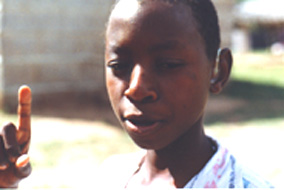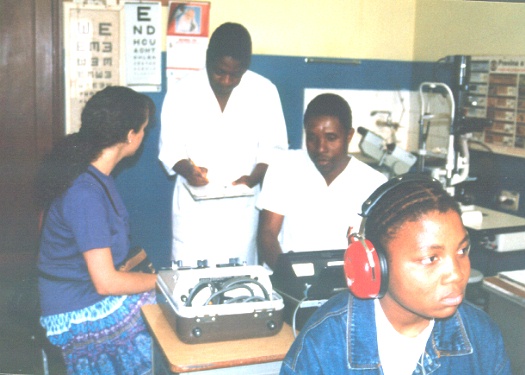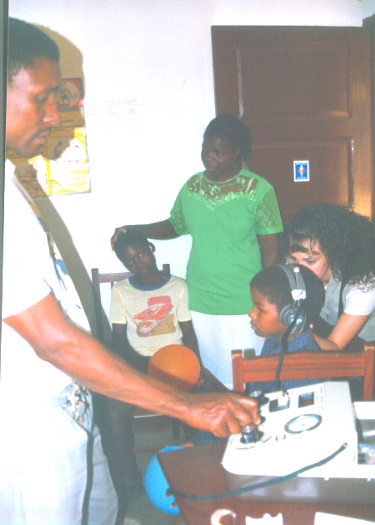J.L.
Clark, PhD/CCC-A, F-AAA
Callier Center for Communication
Disorders The
University of Texas at Dallas
MOZAMBIQUE
 Chicuque, Mozambique
Chicuque, Mozambique
The first
Audiology Mission Trip, in August 1998 was considered a limited success
with the expectations of training hospital personnel to conduct hearing
tests, and providing complimentary hearing aids with supplies when a hearing
loss was identified. None of the hospital technologists were taught
to perform hearing tests, which would enhance their skill base for which
they are paid $40.00 a month. In all, 6 of the 7 donated hearing
aids were dispensed with batteries, free of charge to people from all walks
of life. Fernando, the hospital ambulance driver, Juan a student,
Samuel, an 80 year old church elder, Laila, a young nurses aide,
Fernando and of course Servalito were speechless when we sent them on their
way. They were given a gift that was beyond their wildest hopes.
There were several cases of impacted cerumen, and until they were instructed,
the nurses believed the condition to be untreatable. Otitis media
was identified, but lacking antibiotics only increased the incidence of
hearing loss.
One particularly memorable hearing
aid fitting was with Servalito, the "deaf-mute" (as the local folks called
him), who lived at the orphanage at Teles. After a few hearing aid
trials, Servalito's eyes flashed a startled look as I surprised him with
a slammed door behind him.
 Servalito,
the first Mozambiqan to receive a hearing aid
Servalito,
the first Mozambiqan to receive a hearing aid
Training the hospital Technologists 
I to
conduct basic hearing evaluations
to
conduct basic hearing evaluations








Since that
first trip, there have been annual accomplishments and frustrations.
1)
The project has continued
to grow in depth and breadth. Each year the hospital technologists
continue to acquire more advanced training in Audiology. Not only
does Miguel, the primary technologist trained in Audiology, know how to
conduct pure tones and taped speech threshold testing and immittance measures,
dispense the donated batteries on a restricted basis, but has also been
trained to trouble shoot hearing aids and perform electroacoustic checks
on hearing aids with the hearing aid analyzer donated.
2)
Perhaps the most equally heart-warming
and frustrating project involved working with a classroom of 11 hearing-impaired
children, ranging in age from 8 to 15 years. Their hearing was subjectively
assessed by the Social Worker, and the school agreed to create a classroom
for these special children that had been found throughout the Inhambane
Province. Some of the children had been sent many miles from home
to attend classes in Maxixe, and as a result became children living on
the streets.

Though the school is considered
one of the best in the province, there is no running water or electricity,
nor many of the conveniences we associate with standard educational opportunities.
All of the children have their hearing assessed annually by the Chicuque
Hospital Medical technologist, Miguel, and our team so that hearing
aids can be dispensed or modified accordingly for each of these hearing
impaired children. Of course the classroom teacher has been very involved,
and to say that her teaching style was significantly changed from the first
day we met is an understatement!
Clark
Home Page
 Send
email to Dr. Clark
Send
email to Dr. Clark
Chicuque, Mozambique









